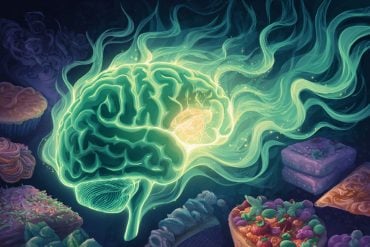Summary: Suffering from frequent colds and flu may impact brain aging, accelerate cognitive decline, and could increase the risk of developing Alzheimer’s disease. In mice, intermittent experiences of moderate inflammation, such as that caused by the flu or common cold, caused impaired cognition and disrupted neural communication.
Source: Tulane University
Getting sick often may impact how quickly the brain ages and increase the risk of dementia or other forms of cognitive decline.
These are the findings of a Tulane University study conducted in partnership with West Virginia University and the National Institutes of Occupational Safety and Health and published in the journal Brain, Behavior and Immunity.
The study examined aging male mice and found that repeated, intermittent experiences with moderate inflammation, such as that caused by the flu or a seasonal head cold, caused impaired cognition and disrupted communication between neurons in those mice.
“We were interested in asking whether differences in infection experience could account, at least in part, for the differences in rates of dementia we see in the population,” said lead author Elizabeth Engler-Chiurazzi, PhD, a behavioral neuroscientist in the Tulane Department of Neurosurgery.
“The mice we were studying were adults approaching middle age that had intact faculties, and yet, when exposed to intermittent inflammation, they remembered less and their neurons functioned more poorly.”
This study is the first to model repeated, intermittent infections in mice and examine the long-term consequences for brain function and health.
Humans often experience infections and inflammation at substantially higher rates than laboratory mice. But given that impairments were observed in mice after only five intermittent inflammatory treatments, the cognitive change in humans may be more robust.

“Our mice only experienced intermittent sickness-like inflammation a handful of times, so the fact that we observed impairments at all was surprising,” Engler-Chiurazzi said.
“The effects were subtle, but that’s why I find these results meaningful: In a human, cognitive impairments from a similar number of inflammatory experiences might not be noticeable in their daily lives but could have cumulative effects that negatively impact the aging brain.”
The findings may have important implications for standard of care around how infections are handled among the elderly and those at risk for dementia. And they are perhaps more relevant in light of the COVID-19 pandemic and ongoing research around the effects of long-COVID syndrome.
Going forward, Engler-Chiurazzi said more work needs to be done to understand why infections impact the brain and how to mitigate those effects. In addition, she hopes follow-up studies will investigate whether more vulnerable populations impacted by health disparities face a higher burden of neurological effects.
“The biggest take away from this research, in our opinion, is the importance of staying as healthy and infection-free as possible,” she said.
About this Alzheimer’s disease research news
Author: Andrew Yawn
Source: Tulane University
Contact: Andrew Yawn – Tulane University
Image: The image is in the public domain
Original Research: Open access.
“Intermittent systemic exposure to lipopolysaccharide-induced inflammation disrupts hippocampal long-term potentiation and impairs cognition in aging male mice” by Elizabeth Engler-Chiurazzi et al. Brain, Behavior, and Immunity
Abstract
Intermittent systemic exposure to lipopolysaccharide-induced inflammation disrupts hippocampal long-term potentiation and impairs cognition in aging male mice
Age-related cognitive decline, a common component of the brain aging process, is associated with significant impairment in daily functioning and quality of life among geriatric adults.
While the complexity of mechanisms underlying cognitive aging are still being elucidated, microbial exposure and the multifactorial inflammatory cascades associated with systemic infections are emerging as potential drivers of neurological senescence.
The negative cognitive and neurobiological consequences of a single pathogen-associated inflammatory experience, such as that modeled through treatment with lipopolysaccharide (LPS), are well documented. Yet, the brain aging impacts of repeated, intermittent inflammatory challenges are less well studied.
To extend the emerging literature assessing the impact of infection burden on cognitive function among normally aging mice, here, we repeatedly exposed adult mice to intermittent LPS challenges during the aging period. Male 10-month-old C57BL6 mice were systemically administered escalating doses of LPS once every two weeks for 2.5 months.
We evaluated cognitive consequences using the non-spatial step-through inhibitory avoidance task, and both spatial working and reference memory versions of the Morris water maze. We also probed several potential mechanisms, including cortical and hippocampal cytokine/chemokine gene expression, as well as hippocampal neuronal function via extracellular field potential recordings.
Though there was limited evidence for an ongoing inflammatory state in cortex and hippocampus, we observed impaired learning and memory and a disruption of hippocampal long-term potentiation. These data suggest that a history of intermittent exposure to LPS-induced inflammation is associated with subtle but significantly impaired cognition among normally aging mice.
The broader impact of these findings may have important implications for standard of care involving infections in aging individuals or populations at-risk for dementia.







